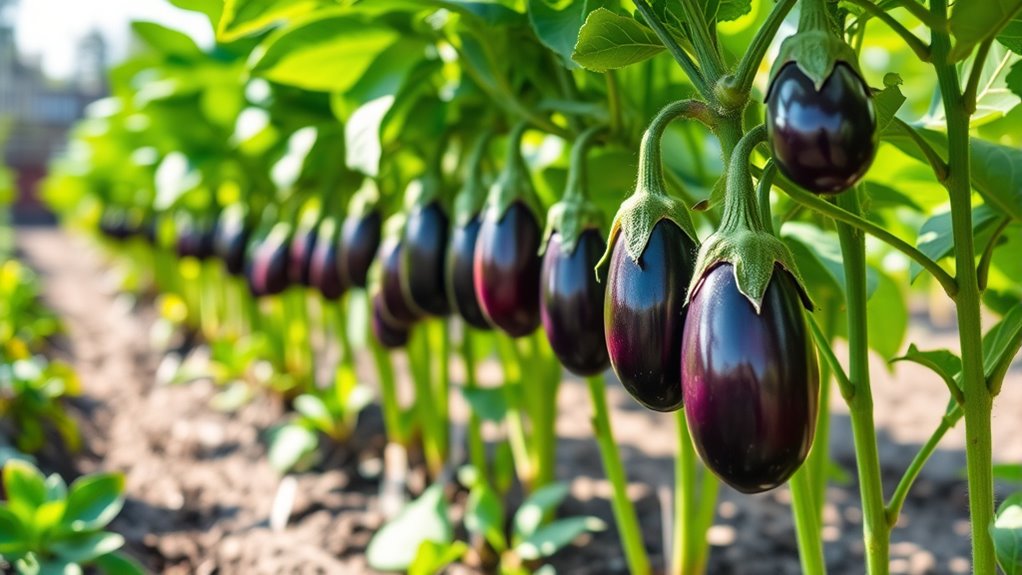Eggplants typically grow between 40 and 150 cm (1 ft 4 in to 4 ft 11 in), depending on the variety you choose. Some Asian types might only reach about 18 inches, while larger varieties can grow even taller. These plants may need support due to their heavy fruit. Be sure to consider their space and care requirements for optimal growth. There's much more to explore about planting and maintaining these veggies for a successful harvest!
Key Takeaways
- Eggplants typically grow between 40 to 150 cm tall, depending on the variety and growing conditions.
- Asian varieties usually reach about 45 cm, while larger-fruited types can grow up to 90 cm.
- Semi-wild types can achieve heights of up to 225 cm, requiring support due to heavy fruit.
- Optimal growth occurs in well-drained, deep soil with a pH of 5.5 to 7.0.
- Ensure at least six hours of direct sunlight daily for best growth and fruiting.
Understanding Eggplant Growth Height
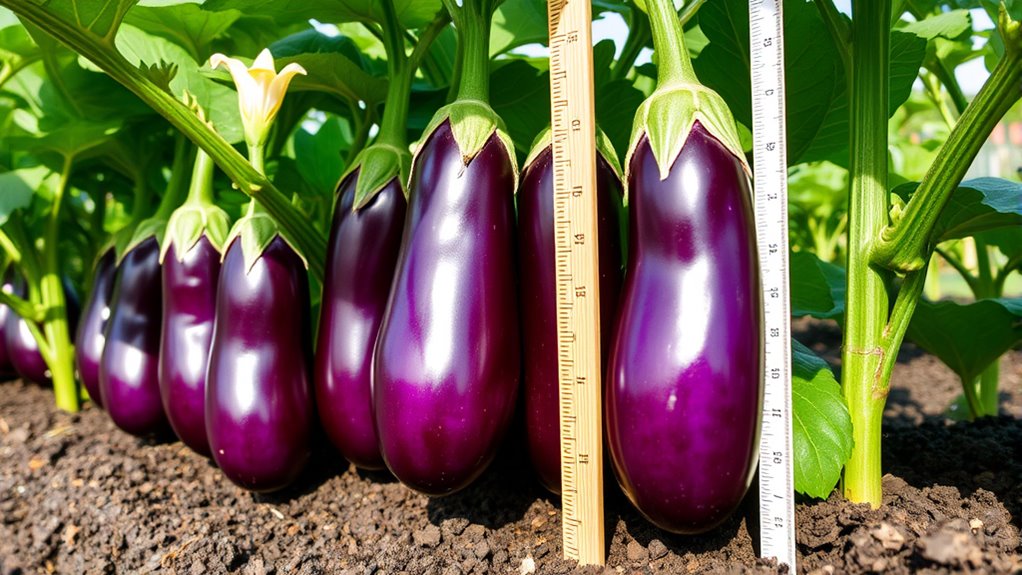
When you're growing eggplants, it's important to know that they typically reach heights between 40 to 150 cm (1 ft 4 in to 4 ft 11 in).
Some varieties, like the Asian types, may only grow about 18 inches tall, while larger-fruited plants can reach 24 to 36 inches.
Eggplants grow upright on shrubby plants, but they might need support due to heavy fruit. Using stakes or cages helps keep them upright and prevents them from toppling over.
Interestingly, semiwild types can grow significantly taller, reaching up to 225 cm (7 ft 5 in).
Factors like temperature, sunlight, and watering also influence their growth, so ensure you provide the right conditions for optimal height and health.
Optimal Soil Conditions for Eggplants
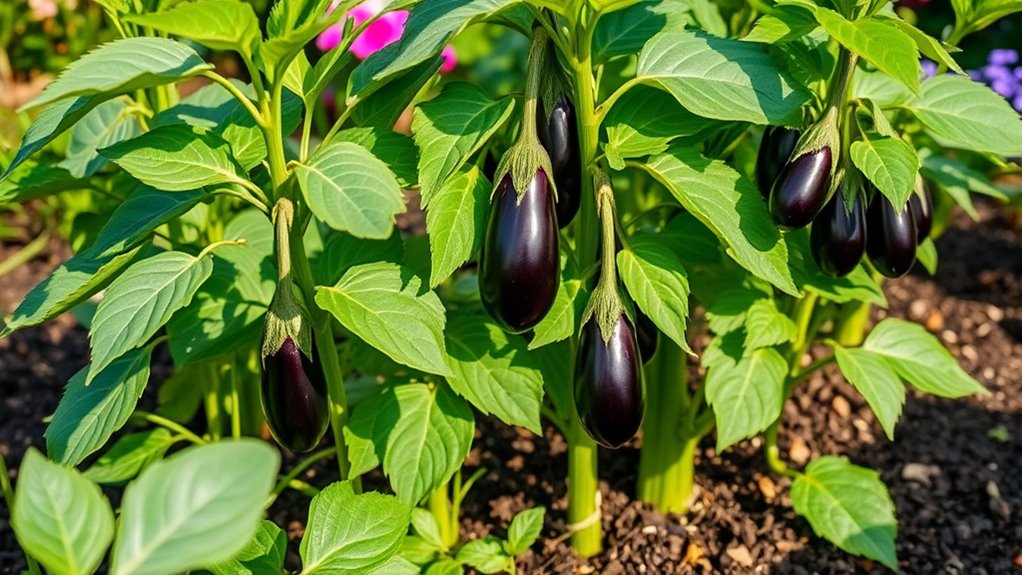
To grow healthy eggplants, you'll want to ensure the soil conditions are just right. Aim for sandy loam or silt loam, as these provide excellent drainage and aeration.
Make sure the soil is several feet deep to support eggplants' root systems, and avoid heavy clay that can lead to root rot. A pH between 5.5 and 7.0 is ideal, so conduct a soil test and amend as needed.
Incorporate organic matter like compost to boost fertility and structure. Keep the soil moist but not waterlogged, using drip irrigation for optimal moisture control.
Raised beds can improve drainage, while mulching helps retain moisture and suppress weeds, creating the perfect environment for your eggplants to thrive.
Sunlight and Temperature Needs
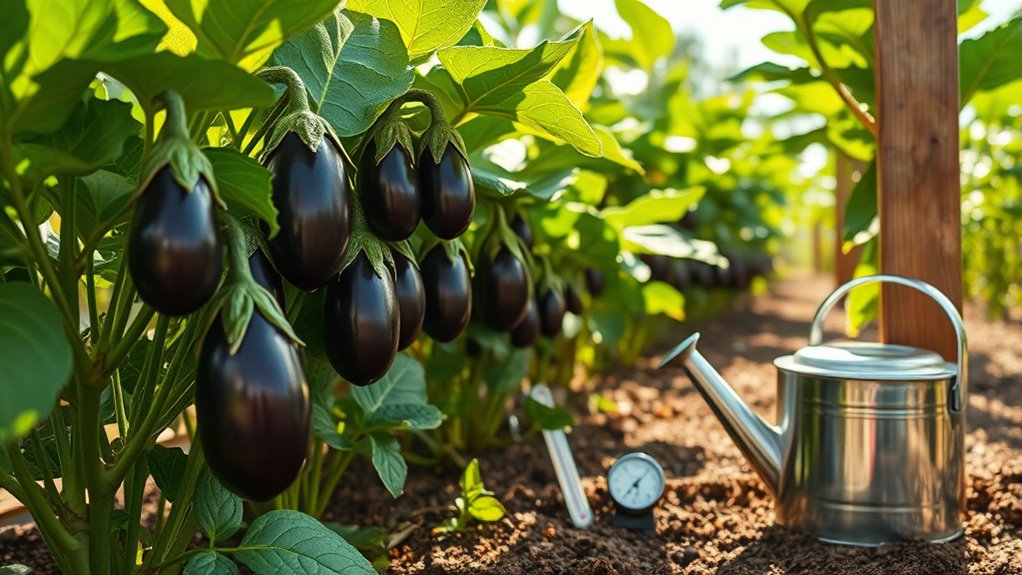
After ensuring optimal soil conditions for eggplants, it's time to focus on their sunlight and temperature needs.
Eggplants thrive in full sun, needing at least six hours of direct sunlight daily for optimal growth and good pollination. While they can tolerate partial shade in hot climates, a bit of shade can prevent overheating and promote larger fruit.
Eggplants require at least six hours of full sun daily for optimal growth and pollination, thriving best in warm conditions.
Aim for temperatures above 70°F for the best results, as eggplants struggle to set fruit below 65°F. Dark-colored containers can help accumulate heat in cooler areas, and consistent warmth is crucial for healthy growth.
If you're in a cooler region, consider planting in raised beds or using protective coverings to maintain warmth during chilly nights.
Effective Watering Techniques
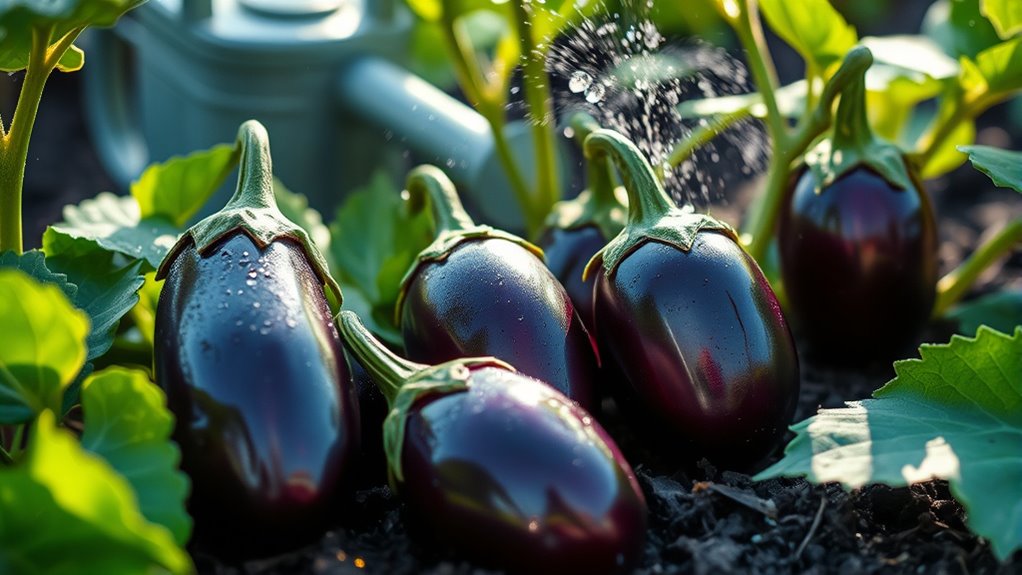
Effective watering techniques are crucial for growing healthy eggplants, as they thrive on a consistent moisture level. Aim to provide about 1-2 inches of water per week using soaker hoses or drip systems for even distribution.
Avoid overwatering; standing water can lead to root rot. To measure rainfall and additional watering needs, consider using a rain gauge. Adjust your watering schedule based on weather conditions, and check soil moisture regularly to prevent over-saturation.
For even coverage, move sprinklers around and use the tin can method to gauge water distribution. Mulching with organic materials helps retain moisture while suppressing weeds, ensuring your eggplants stay hydrated and productive throughout the growing season.
Nutritional Requirements and Fertilization
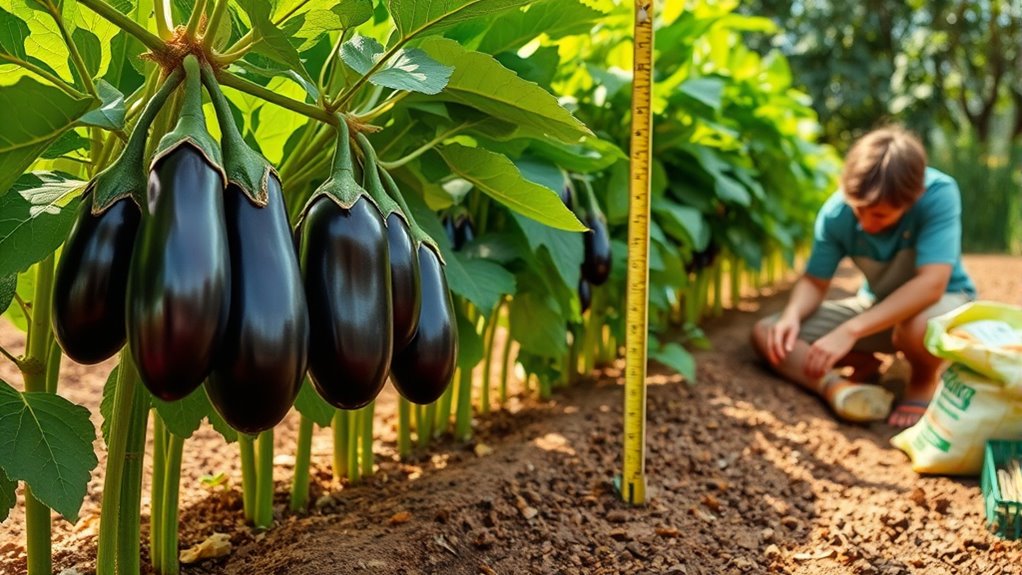
When growing eggplants, understanding their nutritional requirements and fertilization needs is essential for achieving healthy plants and a bountiful harvest.
Start by ensuring your soil has a pH between 5.5 and 7.0 for optimal growth. Conduct soil tests to identify specific nutrient deficiencies. Incorporate well-composted organic matter, applying no more than 1 inch per 100 square feet, and consider side-dressing with nitrogen at 4 and 8 weeks after planting.
Avoid high-nitrogen fertilizers, as they can lead to excessive leaf growth. Instead, use balanced fertilizers and well-rotted manure to provide essential nutrients. Following the manufacturer's instructions for application will help you avoid over-fertilization, ensuring your eggplants thrive throughout the growing season.
Harvesting and Maintenance Best Practices
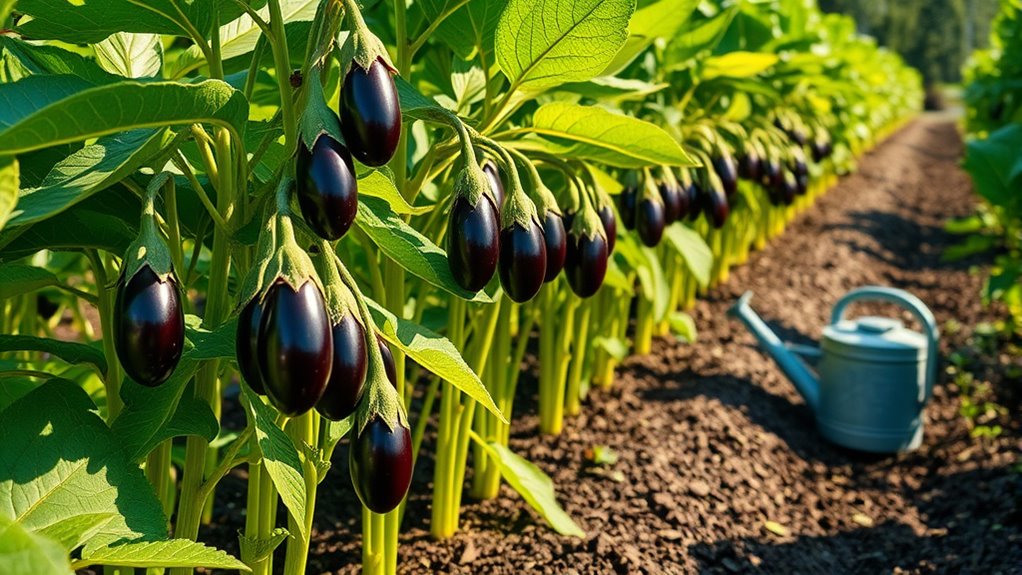
Once you've ensured your eggplants have the right nutrients, it's time to focus on harvesting and maintenance to maximize your yield.
Harvest your eggplants when their skin is glossy and firm, just before seeds become visible. Use pruners or a sharp knife, leaving a short stem above the calyx. Frequent harvesting encourages more fruit over several days.
For maintenance, protect your plants from frost and ensure regular watering without soggy soil. Mulch to retain moisture and suppress weeds, and stake plants to keep them upright.
Handle eggplants gently to avoid bruising, storing them at room temperature away from sunlight. Remember, overripe eggplants can turn bitter, so pick them at the right time for the best flavor.
Frequently Asked Questions
What Are the Common Pests That Affect Eggplant Growth?
Common pests affecting your eggplant growth include aphids, whiteflies, flea beetles, Colorado potato beetles, and hornworms.
Aphids cluster on leaves, causing yellowing, while whiteflies can lead to sooty mold.
Flea beetles create holes in leaves, particularly damaging to young plants.
Colorado potato beetles feed on foliage, and hornworms are large pests that devour both leaves and fruits.
Keeping an eye out for these pests is crucial for maintaining healthy plants.
How Long Does It Take for Eggplants to Mature?
Eggplants eagerly embrace a journey from seed to succulent harvest!
Typically, you'll watch your eggplants mature in about 65 to 100 days from seed, or 60 to 85 days from transplant. That's a relatively quick turnaround for such a delicious dish!
Ensure your plants get plenty of sunlight and warmth, and you'll soon see gorgeous glossy fruits ready for picking.
Keep an eye on them, and you'll enjoy a bountiful harvest!
Can Eggplants Be Grown in Containers?
Absolutely, you can grow eggplants in containers!
Just make sure you use at least a 5-gallon pot for optimal growth. Space your plants well, ideally 12 to 14 inches apart in a larger container.
Choose a high-quality potting soil mix for drainage and nutrients. Ensure they get at least six hours of sunlight daily, and maintain the right temperature and humidity levels for the best results.
Happy gardening!
What Are the Best Companion Plants for Eggplants?
Picture your garden as a bustling café; it thrives with the right companions!
For eggplants, consider planting marigolds to deter pests and attract pollinators. Spinach and lettuce provide ground cover and moisture retention, while basil enhances flavor and repels aphids.
Avoid tomatoes, peppers, and potatoes, as they can spread diseases.
How Do I Know When to Prune My Eggplant Plants?
You'll know it's time to prune your eggplant plants when they start to slow down in production or when they begin flowering.
Prune after harvesting the first set of fruit to encourage new growth. Focus on removing suckers and limiting the number of leaders to enhance yield.
Remember to keep an eye on the plant's overall health and ensure it gets plenty of sunlight for optimal results.
Conclusion
In summary, successfully cultivating eggplants calls for careful consideration of their height, habitat, and health. By providing proper soil, sunshine, and hydration, you'll see your eggplants thrive. With diligent dedication and a dash of diligence, you'll enjoy bountiful bunches of beautiful, bold eggplants ready for harvesting. So, gear up for your gardening journey, and watch as your vibrant vegetables grow from tiny seeds to towering treasures in your backyard! Happy planting!

